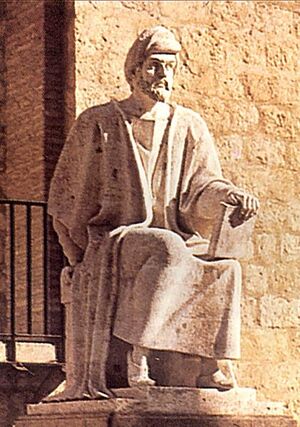Ibn Rushd (nonfiction): Difference between revisions
(Created page with "thumb|Statue of Ibn Rushd in Cordoba, Spain.'''Ibn Rushd''' (Arabic: ابن رشد; 14 April 1126 – 10 December 1198), full...") |
m (Admin moved page Averroes (nonfiction) to Ibn Rushd (nonfiction)) |
(No difference)
| |
Revision as of 18:53, 24 March 2017
Ibn Rushd (Arabic: ابن رشد; 14 April 1126 – 10 December 1198), full name (Arabic: أبو الوليد محمد ابن احمد ابن رشد, translit. ʾAbū l-Walīd Muḥammad Ibn ʾAḥmad Ibn Rushd), often Latinized as Averroes (/əˈvɛroʊˌiːz/), was a medieval Andalusian polymath.
He wrote on logic, Aristotelian and Islamic philosophy, theology, the Maliki school of Islamic jurisprudence, psychology, political and Andalusian classical music theory, geography, mathematics, and the mediæval sciences of medicine, astronomy, physics, and celestial mechanics. Ibn Rushd was born in Córdoba, Al Andalus (present-day Spain), and died at Marrakesh in present-day Morocco. His body was interred in his family tomb at Córdoba.
The 13th-century philosophical movement in Latin Christian and Jewish tradition based on Ibn Rushd's work is called Averroism.
Ibn Rushd was a defender of Aristotelian philosophy against Ash'ari theologians led by Al-Ghazali. Although highly regarded as a legal scholar of the Maliki school of Islamic law, Ibn Rushd's philosophical ideas were considered controversial in Ash'arite Muslim circles. Whereas al-Ghazali believed that any individual act of a natural phenomenon occurred only because God willed it to happen, Ibn Rushd insisted phenomena followed natural laws that God created.
Ibn Rushd had a greater impact on Christian Europe, being known by the sobriquet the Commentator for his detailed emendations to Aristotle. Latin translations of Ibn Rushd's work led the way to the popularization of Aristotle.
In the News
Fiction cross-reference
Nonfiction cross-reference
External links:
- Averroes @ Wikipedia
Attribution:
